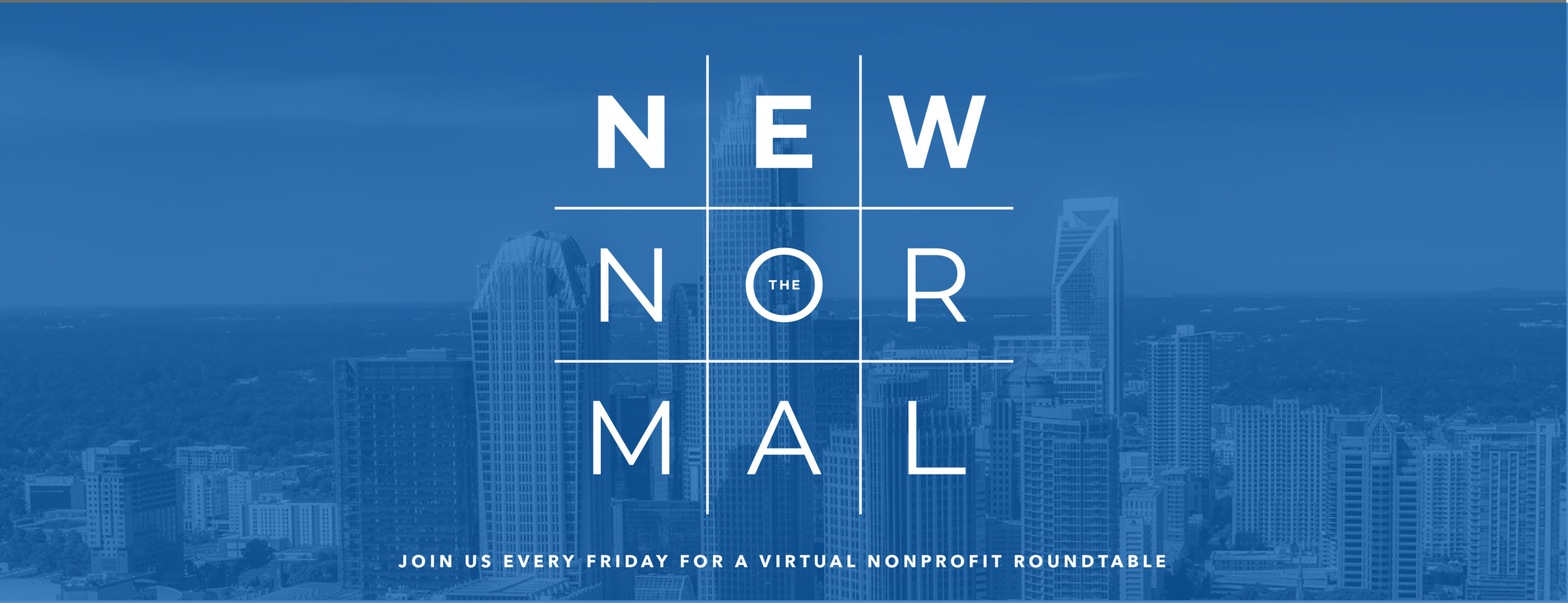By Caylin Haldeman
Thank you to everyone who joined us last Friday for The New Normal. Don’t forget to sign up for next week’s roundtable, Budget Shortfalls and Bold Leadership, and check out our May #NewNormalCLT series on Revenue Development to register for upcoming events here!
While we intentionally keep these roundtables short, we know there is so much more to explore within each topic. Here are some of the biggest takeaways from our time with Tina Postel, Executive Director of Loaves & Fishes, Michael DeVaul, Chief Social Responsibility Officer at the YMCA of Greater Charlotte and Amy Jacobs, Executive Director of SHARE Charlotte.
Embracing Creativity
Last week was Do Good Week (HOME Edition!) here in Charlotte, and nonprofits all over the city were busy creating fun and engaging ways for volunteers to support them from home. Amy Jacobs shared that generating unique opportunities for engagement is an effective way to get in front of new audiences during the Stay at Home Order. While it’s important to continue to lean on your existing network, reaching out to new volunteers expands your reach and grows your brand in the community. She suggested designing both hands-on and skill-based volunteer opportunities for individuals and families to support your work. While Do Good Week wrapped up over the weekend, our city’s desire to support local nonprofits has not. Connect with SHARE Charlotte to learn more about creating compelling volunteer opportunities for your nonprofit.
Operationalizing Remote Opportunities
Loaves & Fishes has transformed its operating model over the last month — moving to a mobile pantry-based distribution strategy and vastly growing its output to serve the increased demand for access to food in our region. With these shifts came changes to their need for volunteers: no availability for volunteers in the warehouse, limited opportunities at the mobile pantry sites but significant need for volunteers to support their call center from home. Tina Postel shared that the call center was once a happening spot within their HQ, but due to the Stay at Home Order it has shifted to a virtual model that volunteers can participate in remotely. She suggested cloud-based platforms as key to managing security risks — all volunteers sign robust confidentiality agreements, and have individual log-ins that allow them to do data entry. One local resource that can help nonprofits leverage IT systems to withstand the demands of remote work is Apparo — check out their Navigating the Crisis webinar series to learn more about setting up effective remote workspaces, using technology to connect virtually and more.
Improving Cultural Competency
While we are all navigating waves of change due to COVID-19 and the Stay at Home Order, Michael DeVaul reminded us not to let go of our commitment to increasing cultural competency in volunteer engagement. Now more than ever, there is a need to provide equity-focused and/or trauma-informed training to volunteers before placing them in people-facing roles. Informative trainings have the power to transform one-off volunteer opportunities into relational activities that strengthen the social fabric of our community as a whole. Using resources — like the Racial Equity Insitute’s Groundwater Approach Report, for example — to design virtual training webinars creates opportunities for deeper impact on program participants and volunteers alike. We’ll circle back to this topic in a future roundtable, exploring strategies to help nonprofits ensure their program shifts and crisis response are culturally competent and strategic.
If you weren’t able to join us on Friday, please check out the recording of the webinar here and let us know what you think on Facebook, Twitter, Instagram or LinkedIn using #NewNormalCLT.
